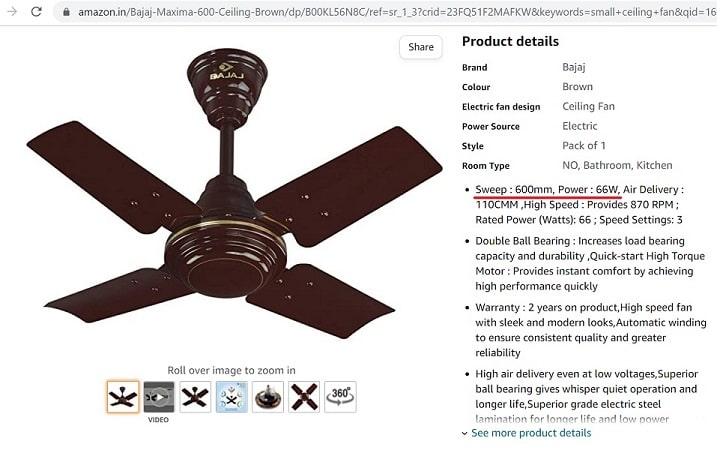Fan Electricity Consumption Calculator
Understanding the Electricity Consumption of a Fan
The electricity consumption of a fan can significantly impact your energy bills. Knowing how to calculate and optimize this consumption is essential for effective energy management. A typical ceiling or table fan consumes between 50 to 100 watts, depending on its size and speed settings.
How to Calculate Electricity Consumption
To determine the electricity consumption of a fan, you can use the formula:
Electricity Consumption (kWh) = Power (W) × Time (h) / 1000For example, if your fan uses 75 watts and runs for 8 hours, the calculation would be:
Electricity Consumption = 75W × 8h / 1000 = 0.6 kWhSteps to Electricity Consumption of a Fan
- Check the wattage of your fan, typically found on the motor or manual.
- Decide the number of hours you plan to use the fan each day.
- Apply the formula above to find out the daily electricity usage.
Tips to Reduce Electricity Consumption of a Fan
To minimize your fan’s electricity consumption, consider the following:
- Use lower speed settings when possible.
- Ensure that your fan blades are clean for maximum efficiency.
- Utilize built-in timers or smart plugs to prevent excessive usage.
Common Mistakes to Avoid
“Many users underestimate the impact of fan placement on energy efficiency.”
Incorrect placement of fans can lead to ineffective airflow and increased energy consumption. Ensure that your fan is located in an optimal position to circulate air efficiently.
10 Key Facts About Electricity Consumption of a Fan
- What is the average wattage of a fan? Most fans consume between 50 and 100 watts when operating.
- How do you reduce the electricity consumption of a fan? Lower speed settings and regular maintenance can help.
- Are ceiling fans more efficient than portable fans? Generally, ceiling fans offer better airflow for lower power usage.
- Can a fan replace air conditioning? While fans do not cool the air, they can create a wind chill effect.
- How often should you clean your fan? Regular cleaning every few weeks maximizes efficiency.
- What is the effect of using a fan in winter? Ceiling fans can be reversed to circulate warm air during colder months.
- Can ceiling height affect fan efficiency? Yes, higher ceilings may require larger fans for effective circulation.
- What is the lifespan of a fan? Most fans last between 10 to 15 years with proper care.
- Do energy-efficient fans exist? Yes, there are models specifically designed for lower electricity consumption.
- How do you electricity consumption of a fan effectively? Use the above formula and tips to track and reduce usage.
Wow, didn’t realize a fan’s energy usage could vary so much! 🤔 Do you think investing in a more energy-efficient one really makes a difference? Considering one for my bedroom. Any suggestions?
Thanks for breaking this down! I had no clue fans were so economical. Also, anyone else leave theirs running 24/7? Yikes, maybe I should check that!
Interesting read! I always assumed fans were kinda energy hogs. Do you think it’d help to use a smart plug to monitor energy use? That could be fun to track.